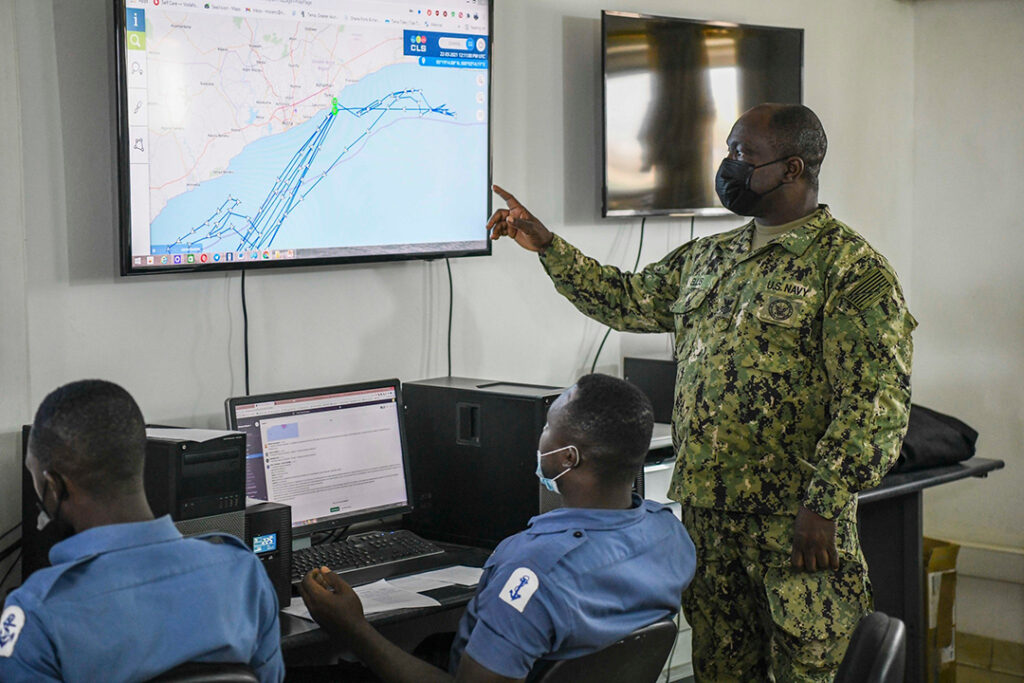ADF STAFF
Every time the Veracruz, a 108-meter refrigerated cargo ship, crossed the sea border from Namibia to Angola, it seemed to disappear.
Possibly engaged in illegal, unreported and unregulated (IUU) fishing, its captain simply turned off its automatic identification system (AIS) tracking signal so authorities wouldn’t know its location.
Known as “going dark,” the practice is especially common among trawlers engaged in transshipment, or the illegal transfer of fish from one vessel to another, which the Veracruz seemed to be involved in, according to a report by E&T, an engineering and technology magazine.
IUU fishing costs West African nations $2.3 billion each year, according to the United Nations. The practice also destroys ecosystems and has been linked to other crimes such as piracy, kidnapping and drug trafficking. China is the world’s worst fishing offender, according to the IUU Fishing Index, and has targeted West Africa for years.
Despite the consequences of IUU fishing, many West African nations do not require that fishing vessels use an AIS, according to Peter Hammarstedt, director of campaigns for Sea Shepherd Global, which helps several West African countries combat illegal fishing.
“It’s impossible to determine how many vessels are not using their AIS systems as there is no international requirement for fishing vessels to use AIS,” Hammarstedt told ADF in an email. “It’s completely up to flag state regulations. In West Africa, all of the European Union-flagged vessels transmit on AIS, but only a small fraction of the Chinese trawlers — I’m talking less than 20%.”
AIS receivers have been in use since 2008 and were meant to support safe navigation and collision avoidance by automatically transferring information about a vessel to other ships. It increasingly has been used in fisheries enforcement.
“The wider compulsory use of AIS that we are seeing in the fisheries sector will not only help to promote safety at sea but also enable enforcement officials to better track and analyze the movements of fishing vessels, allow for better targeting of inspections and increase our overall knowledge of fishing activities,” Nicholas Ntheketha, chair of FISH-i Africa, which works to stop illegal fishing, told the website iuuwatch.eu.
Although the deactivation of a trawler’s AIS often is seen as a red flag to authorities, vessels might have legitimate reasons to turn off the signal — even those that have been cited for illegal fishing in the past.
Hans Mol is managing director of the European fishing cargo company GreenSea Chartering, which is owned 50% by Seatrade, a company that has been fined for violating transshipping rules. Mol told E&T that his fleet often turns off its AIS signal in the Gulf of Guinea, where piracy and other maritime crimes are rising.
In the first quarter of 2021, the Gulf of Guinea accounted for 43% of all piracy in the African region, according to the International Maritime Bureau. The attacks have targeted cargo ships, fishing vessels and passenger boats. Last year, the Gulf of Guinea accounted for more than 95% of all maritime kidnappings globally, according to the bureau.
“There is a constant dialogue whether to turn off our AIS signal. Do you want to be visible for the pirates?” Mol told E&T. “The Gulf of Guinea is where we sometimes switch it off. Our first attack and kidnapping was in 2012” off Nigeria’s coast.

